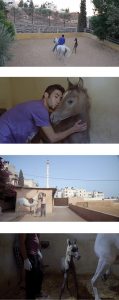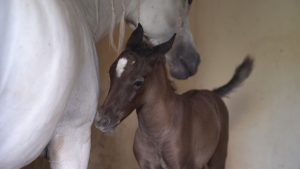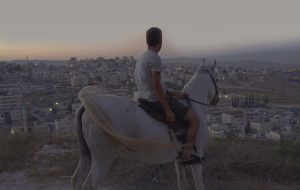Elise Coker’s documentary about a Palestinian family that raises Arabian horses in the West Bank.
The day I began this film and met Abdel Naser Musleh in the spring of 2018 was the day his Arabian mare gave birth to a colt, Mawal al-Nahar, four weeks before the due date. The colt was born with serious health complications that required immediate medical care, and that evening, he almost died.
 Abdel Naser, a young Palestinian horse breeder, lives in Kafr Aqab, an area that is part of the Jerusalem municipality but decisively in the West Bank, behind the separation barrier. That night, his colt was rescued by an Israeli veterinarian who crossed the border into the West Bank to treat the baby horse, despite the restrictions that bar such an entry.
Abdel Naser, a young Palestinian horse breeder, lives in Kafr Aqab, an area that is part of the Jerusalem municipality but decisively in the West Bank, behind the separation barrier. That night, his colt was rescued by an Israeli veterinarian who crossed the border into the West Bank to treat the baby horse, despite the restrictions that bar such an entry.
This scenario hit home to me how the community around Arabian horses straddles the country’s conflict in a way that starkly reveals how it affects every aspect of life, including mundane daily activities and passionate pursuits alike.
It’s clear where Palestinian horse breeders are limited. They have less access to medical care for their animals. They are limited with regard to which shows their horses can compete in and where they can train. And when the options are there, the horses have to deal with being transported through checkpoints in order to compete on a national level. And for horse breeders in East Jerusalem, it is nearly impossible to obtain permits to build stables.
But another important way in which Palestine’s horse community stands apart is that, unlike in other countries and parts of the world, it’s not just extremely wealthy people with fancy stables who own champion Arabian horses. It’s everyday Palestinians who keep the horses in their own houses and yards. And through their love and passion alone, these breeders are able to compete on an international level. The fact that horses are kept in people’s homes directly lends itself to the connection that horse breeding fosters between people who might otherwise never interact. When breeders want to see each other’s horses, they must visit each other in their homes. This creates an intimate connection that genuinely transcends politics and the conflict in ways that other sports and hobbies are not able to achieve.
This film is more about colts than about actual stallions. It is a film about potential: the potential for a country to find freedom, the potential for a boy to become a man, and the potential for a colt to grow into a champion stallion.
The film follows Abdel Naser and his family as they navigate the difficulties of raising these delicate animals in the West Bank. I saw this project as an opportunity to examine the greater issues of the region via the lens of this unique community and Abdel Naser’s love of Arabian horses.
Finally, here’s a link to the video: https://www.topic.com/stallions-of-palestine. Hope you’ll enjoy watching it.
Director Elise Coker



